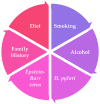Gastric Cancer: Epidemiology, Risk Factors, Classification, Genomic Characteristics and Treatment Strategies
- PMID: 32512697
- PMCID: PMC7312039
- DOI: 10.3390/ijms21114012
Gastric Cancer: Epidemiology, Risk Factors, Classification, Genomic Characteristics and Treatment Strategies
Abstract
Gastric cancer (GC) is one of the most common malignancies worldwide and it is the fourth leading cause of cancer-related death. GC is a multifactorial disease, where both environmental and genetic factors can have an impact on its occurrence and development. The incidence rate of GC rises progressively with age; the median age at diagnosis is 70 years. However, approximately 10% of gastric carcinomas are detected at the age of 45 or younger. Early-onset gastric cancer is a good model to study genetic alterations related to the carcinogenesis process, as young patients are less exposed to environmental carcinogens. Carcinogenesis is a multistage disease process specified by the progressive development of mutations and epigenetic alterations in the expression of various genes, which are responsible for the occurrence of the disease.
Keywords: H. pylori; adjuvant chemotherapy; gastric cancer; incidence; molecular markers; mortality; targeted therapy.
Conflict of interest statement
The authors declare no conflict of interest.
Figures
References
Publication types
MeSH terms
LinkOut - more resources
Full Text Sources
Medical
Miscellaneous



